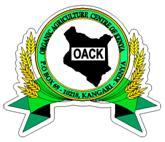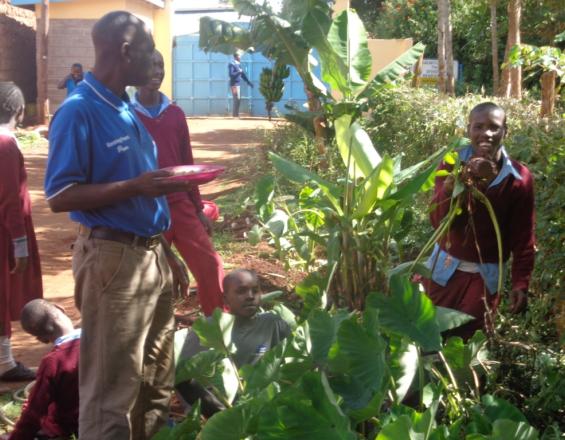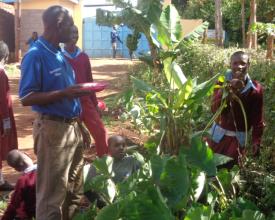
Agro Biodiversity for nutrition security a case of Joy town school

SCOPE Kenya, promotes permaculture practices to support school communities to redesign their school ground and establish sustainable productive land scape, with food forest and cool micro climate, for enhanced learning, abundance and resilience.
To enhance sustainable solutions to hunger and restoration of degraded land, SCOPE uses a participatory holistic school development approach, which involves working with all schools stakeholders (pupils, teachers, parents/surrounding communities and local leaders) and use local resources for production of healthy safe food, protect nature and equip learners will life skills for self reliance.
Through this, children from poor, food insecure background are assured of one meal while in school, resulting to improved health and academic performance.
This also enhnaces soil and water management, waste management and increase in number of tree seedling planted, hence attracting birds, monkeys and insects.
Context
Challenges addressed
Social Challenges
- Hunger/ food insecurity.
- Unemployment among youths
- school drop out due to lack of food/ feeding program
Environmental Challenges
- Loss of biodiversity
- Low agro biodiversity
Economic
Poverty due to poor production
Location
Process
Summary of the process
needs assessment for facilitators
needs assessment for beneficiaries
capacity building on use of Integerated Land Use Design( ILUD) tool
Implemetation, participatory monitoring and evaluation
Building Blocks
Integrated Land Use Design
This is an inclusive and participatory process that school communities use to develop whole school land design and food forest to meet their needs.
It involves working with all school community/Stakeholders( pupils, teachers, parents, surrounding and local leaders}
Enabling factors
1. Use of local available resources
2. involvenment of pupils, teachers and parents leading to intergeneration learning
3. Use of existing institutional structure and systems
4. Joint responsibility
5. It based on community felt needs
Lesson learned
1. improved working relationship between stakeholders
2. Its a good approach in addressing other social problems affecting communities like, negative attitude towards agriculture among youths. youth unemployment, crime.
Challenges
1. it takes time to take off, because one need to mobilize and create awareness among various stakeholders.
2. Negative attittude towards agriculture in school.
3. Inadequate time allocated for extra carricula activities in schools
Resources
Facilitation skills
For effective implementation, It requires highly skilled and experienced facilitator to work with various stakeholders like pupils, teachers and community members.
Enabling factors
1.use of existing facilitator
2. use of existing institution
3. Use of multistakeholder approach
Lesson learned
1. institutional interest should be considered when working with many stakeholders
2. it takes time for field staff to understand, gain experience and confidence to facilitate this process.
Resources
Impacts
Through this Integrated Land Use Design Approach, we have seen great improvement in,
- Land restoration and utilization for food production of healthy safe and nutritious food
- Adoption of land use methods that help in climate change adaptation and mitigation
- Increased access to food by school children and teachers
- Increased retention of children in school, resulting to improved academic performance
Improved school environment with diversity of food crops in the food forest, which is also home for birds and insects
Beneficiaries
1. school going children
2. Teachers
2. youth out of school
3. parents/surrrounding community members through peer to peer.
Sustainable Development Goals
Story
Sarah Boro, a teacher in Ikuma primary school, which works with SCOPE Kenya, is a happy woman today. In 2015, she attended one week training in permaculture practices in her school.Though initially she had no interest in agricultural activities becasuse, she found it very expensive, involving hard labour and low returns. This time on noting that, permaculture is about designing and establishing sustainable production systems, using local available resources, she found it worthy trying, as it could enable her produce own food.
In her school, she learnt how to produce food and especially vegetables and arrow roots using rain runoff. Back at home, she established her own vegetable gardens arrow root gardens .
Since then, she has moved from buying to sellings, as she produces enough vegetables and arrow roots for her own consuption and sells to neighbouring communities.
on the other hand, she has become a community trainer, as majority of people from her community, comes for consultion over the weekend.



